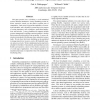Free Online Productivity Tools
i2Speak
i2Symbol
i2OCR
iTex2Img
iWeb2Print
iWeb2Shot
i2Type
iPdf2Split
iPdf2Merge
i2Bopomofo
i2Arabic
i2Style
i2Image
i2PDF
iLatex2Rtf
Sci2ools
OSDI
1994
ACM
1994
ACM
Lottery Scheduling: Flexible Proportional-Share Resource Management
This paper presents lottery scheduling, a novel randomized resource allocation mechanism. Lottery scheduling provides efficient, responsive control over the relative execution rates of computations. Such control is beyond the capabilities of conventional schedulers, and is desirable in systems that service requests of varying importance, such as databases, media-based applications, and networks. Lottery scheduling also supports modular resource management by enabling concurrent modules to insulate their resource allocation policies from one another. A currency abstraction is introduced to flexibly name, share, and protect resource rights. We also show that lottery scheduling can be generalized to manage many diverse resources, such as I/O bandwidth, memory, and access to locks. We have implemented a prototype lottery scheduler for the Mach 3.0 microkernel, and found that it provides flexible and responsive control over the relative execution rates of a wide range of applications. The ...
Lottery Scheduling | Operating System | OSDI 1994 | Relative Execution Rates | Resource Allocation |
| Added | 02 Nov 2010 |
| Updated | 02 Nov 2010 |
| Type | Conference |
| Year | 1994 |
| Where | OSDI |
| Authors | Carl A. Waldspurger, William E. Weihl |
Comments (0)

